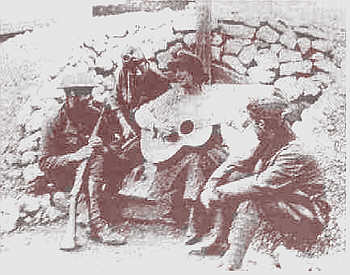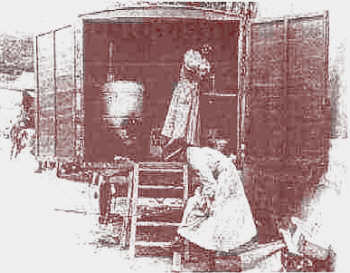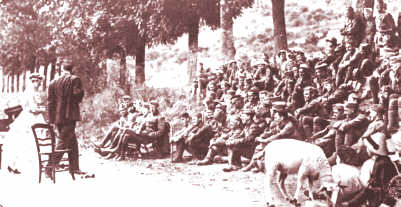By
Captain Ralph Blanchard, USN, Ret.
Traditionally, Americans have demonstrated an abiding concern for the well-being of the young people serving their country in the military. While the popularity of the military as an institution vacillates from one generation to the next, the American people have not wavered in their appreciation and gratitude for the men and women who go in harm's way for their country. That gratitude was clearly evident during America's participation in the Great War.
The primary conduit of public goodwill directed to service personnel in the military historically has been the Young Men's Christian Association with an unbroken service predating the Civil War. The YMCA's unique record of service traces its volunteer work through a range of programs that have served and continue to serve the morale and well being of uniformed personnel and military family members.

Front Line Hut
In its early history, YMCA programs and services were commonly referred to as "welfare" work, especially during the first world war; but the word is used in a somewhat different context today, and contemporary YMCA work with military communities is described as human services. Its goals, however, are the same as they were during that war to help develop the spiritual, mental, and physical strength of service men and women and military families.
In the years between the Civil War and the Great War, the YMCA developed and provided programs and services that addressed both the temporal and spiritual needs of American service members. Within the armed forces, services like those offered by the YMCA were not fully developed to meet those needs and certain programs did not exist at all.
The Great War marked a paradigm shift in the way military leaders conceptualized programs that address the human needs of their personnel. Today, many of the programs, once provided by the YMCA, are institutionalized within each military service. Nonprofit organizations that serve the military now address the needs and gaps existing in the professional human services programs conducted on the installation; and military leaders acknowledge there is a continuing great need for the charitable ~ support of civilian communities such as that provided through the Armed Services YMCA.
The list of programs and services that the YMCA has conceived, developed and provided the military during the last 136 years and which now are institutionalized on each installation is long and illustrious. Among them are morale, welfare and recreation (MWR) activities; rest-and-recreation (R&R) programs for battle-weary soldiers, sailors and marines, and canteens and overseas exchanges operated during the first world war that modernized the exchange concept.
Overseas entertainment for the troops, which the YMCA had initiated during the Spanish-American War, was expanded during the first world war. It would be developed even further in World War II by the United Service Organizations for National Defense (soon to be known simply as the USO), which was created under the leadership of the YMCA and five other social services organizations. Troop education was a substantial YMCA program, highly visible during the first world war and today considered a very important element of quality of life by each military branch.
Services and programs such as these are mainstays on today's military installations along with others that have an impact on quality of life in the armed forces and readiness.
Brief History of the YMCA

YMCA Worker Corinne Francis Entertains Two Doughboys
The history of the YMCA work with the military actually predates the Civil War. Historian C. Howard Hopkins noted that the YMCA's Portsmouth Association in 1856 received the government's endorsement to place books in the navy's Portsmouth training ship and later received permission to hold religious meetings. According to a YMCA journal of the time, similar services were initiated by the Boston Association in 1859.
Formally, however, the YMCA dates its service to the early months of the Civil War when a handful of YMCA members sought to provide helpful services "by whatever means they could" to the troops at war. In November 1861, fifteen YMCA associations formally gathered to coordinate efforts to alleviate the suffering of the sick and wounded. To perform these tasks the group formed an organization it called the United States Christian Commission, whose purpose was to provide spiritual and physical comfort to soldiers.
When advised of the U. S. Christian Commission's plans, President Lincoln wrote to YMCA leaders of his support, stating, "I sincerely hope your plan may be as successful, as it is just and generous in conception."
Lincoln's hopes were fully realized. During its four years of operations during the Civil War the commission recruited an estimated 5000 volunteer "delegates" who served without pay in every theater of the war. It was the nation's first large-scale civilian volunteer service corps.
The Red Cross, which would become the preeminent agency for matters related to "relief," had not yet been created and the military chaplaincy was in its infancy. For those reasons, volunteers were recruited by the Christian Commission from many fields. They served as surgeons, nurses, chaplains and chaplains' assistants, while others distributed emergency medical supplies, food and clothing. They served on the battlefields with horse-drawn canteens, built and operated special diet kitchens in hospitals, brought books and prefabricated chapels to soldiers, taught enlisted men to read and write, maintained a hotel for soldiers on furlough and provided free meals.

Just Behind the Argonne Forest Front
Prisoner of War Work
YMCA prisoner-of-war work —which was to be undertaken on a massive scale in the following century's two world wars — began during the Civil War, with the YMCA ministering to the needs of Confederate soldiers imprisoned in the north and Union soldiers in the south.
Journals record that the YMCA through the U. S. Christian Commission distributed some 100,000 cases of food, clothing and medical supplies, and a total of 12 million books, magazines and pamphlets. Volunteer "delegates" wrote an estimated 90,000 letters for the sick and wounded, and distributed $1000 a week in postage for troop correspondence.
During the period of peace after the Civil War, the YMCA continued its services, largely in state militia camps. New programs and services were introduced, including the military's first recreational and sports programs and counseling services for military personnel.
The tradition of serving the troops beyond the nation's borders began during the Spanish-American War, when YMCA staff and volunteers were dispatched to Cuba, Puerto Rico and the Philippines. YMCA supplies, including medicine and office materials, reached Cuba before the army's own supplies; and early dispatches from Teddy Roosevelt's Rough Riders were written on YMCA stationery. Similar army use of YMCA stationery occurred during military operations in Europe a few years later.
General John J. Pershing, appreciative of the support that the YMCA had provided the Army during action along the U. S.- Mexican border, at the beginning of the Great War would task the YMCA with enormous responsibilities.
In the years before that war, the YMCA had developed mobile canteens and recreational facilities and had broad expertise in service to the armed forces. It was an expertise that would soon blossom into a massive program of morale and welfare services for the military on the home front and particularly overseas.
When war was declared in 1917, the YMCA immediately volunteered its support, and President Woodrow Wilson quickly accepted it. The YMCA assumed military responsibilities on a scale that had never been attempted by a nonprofit, community-based organization in the history of our nation and would never be matched again. It was at the conclusion of that war that the military services began to institutionalize the massive human services work carried out by the YMCA.
Scope of Service
In a forward to a history of YMCA work during and immediately after the Great War, William Howard Taft wrote:
|
This work (the history) sets forth one of the greatest achievements of peace in all the history of human warfare. The American Young Men's Christian Association in its welfare work served between four and five millions of American soldiers and sailors, at home and overseas. As General Pershing has said, it conducted nine-tenths of the welfare work among the American forces in Europe. Moreover, alone among American welfare societies, this organization, first and last, ministered to not less than nineteen millions of the soldiers of the Allied Armies and extended its helpful activities to over five millions of prisoners of war. Its operations were conducted on western, southern, and eastern fronts in Europe; in northern and eastern Africa; in western, southern, and eastern Asia; in North and South America; and in different parts of the island world. It may be questioned whether in all time a human society has ever brought its helpful ministry to such vast numbers of men and over such wide areas, under such varying conditions, and in so short a time. |
The long and detailed history which contains Taft's observation is a two-volume work titled Service With Fighting Men: An Account of the Work of the American Young Men 's Christian Associations in the World War (New York: Association Press, 1922). Taft chaired the editorial board that published the history.
Statistics
A few of the statistics drawn from YMCA records and journals reflect the scale of operations in which the YMCA was engaged:
-
26,000 paid staff of men and women served with the YMCA.
- 35,000 volunteers attending to the spiritual and social needs of an armed force of 4.8 million troops.
- It performed 90 per cent of all welfare work with American Expeditionary Forces in Europe.
- 286 casualties, including six men and two women working under the YMCA banner killed in action.
- 319 citations and decorations awarded YMCA staff and volunteers, including the French Legion d'Honneur, the Order of the British Empire, the Distinguished Service Cross and the Distinguished Service Medal.
- Operated 26 R&R leave centers in
France that accommodated 1,944,300 American officers and men.
- 4000 "huts" and tents operated for recreation and religious services.
- 8000 troop trains served by YMCA volunteers.
- The mobilization of 1470 entertainers sent overseas to perform for troops.
- 1500 canteens and post exchanges officially operated under policy and restrictions established by the army.
- 44 factories in Europe for the production of cookies and candy for the troops.
- 80,000 educational scholarships given by the YMCA to veterans of the Great War, a forerunner of the GI Bill.
- Humanitarian services for more than
5 million prisoners of war in both
Allied camps detaining enemy troops
and Central Powers camps where
Allied troops were imprisoned.
Unique Era

YMCA Staff at Barthlemont Headquarters
Delivery of welfare services and spiritual support to America's uniformed personnel during the Great War was of a scale that is difficult to envision, and the contributions of the principal provider of "welfare" work during that conflict — the YMCA led to programs that have come to be institutionalized within the military. While most "relief' work was concentrated in the hands of the Red Cross, the services provided by the YMCA covered the "entire range of welfare work carried on in the American Army, and by Americans for the Allied armies," according to Service With Fighting Men.
That detailed account of the YMCA's role in the first world war and its relationship to the government and other social services organizations reflects an amazing chapter in nation's military history.
The sudden mobilization of troops which the authors point out "swamped the American Regular Army and for a while totally changed its character" resulted in a parallel mobilization of social services to address the temporal and spiritual needs of the soldiers, sailors and marines. Of the 13,000 YMCA workers sent to France, for example, only 750 were regular peacetime YMCA staff members.
Other Organizations
A number of organizations shared in the "welfare" operations of the first world war. Initially, historians note, the YMCA with its deep experience — and already equipped for service to the military —was the agency solely authorized to provide these services. As the war got under way, other organizations added their help. The National Catholic War Council, for instance, volunteered its services, first in the United States and then with the America Expeditionary Forces overseas. The Jewish Welfare Board expressed a similar interest in serving military personnel of its faith and was similarly accepted by the War Department. The Young Women's Christian Association offered services for women workers assigned overseas. In addition, the Salvation Army, the American Library Association and a group of local agencies working together as the War Camp Community Service, rounded out the organizations recognized by the federal government for service during the war.
As demobilization was undertaken after the war, the welfare work that had contributed to the well-being of the troops in times of war was recognized as an important and needed element of military operations. Programs grouped under "welfare" became fixed in the minds of military leaders as intrinsic to the maintenance and well-being of armed forces. It also became apparent that much of the work accomplished by the YMCA and other civilian agencies should now rest on the military itself. As Service With Fighting Men notes, "The Army had taken over (from the YMCA) the huge program of education and had carried it through to a sweeping success. More and more the opinion began to be heard that the military authorities, and not any privately initiated welfare societies, should plan for the future of the entire Army and Navy welfare program."
Today's Armed Services YMCA
YMCA programs in military communities complement the programs offered on installations. Military agencies obviously cannot reach all their families, such as the approximately 70 per cent of whom who rent or purchase housing in the private sector. There is not enough government housing. In some instances the Armed Services YMCA provides its services under contract to the military installations but generally depends on public support to finance its programs. services provided during the Great War are still visible in contemporary programs, although reflected in different forms.

Mobile Hut Staffers Preparing Coffee
In the post Cold War period, the programs provided by the network of ranches operated by the Armed Services YMCA get high marks from installation commanders and from those young people benefiting from the services. Recognizing the continuing need for community support, the Armed Services YMCA national board of directors is expanding its programming. Armed Services YMCA ranches and affiliates are conduits for local communities to funnel their appreciation and support to the young men and women serving their country. Their programs provide a "home away from home" just as they did in the first world war.
At the conclusion of the Great War, supreme allied commander Marshal Foch commented on the massive support that was provided by the YMCA during hostilities. His recorded remarks reflected the values that characterized YMCA work in that war and continue to be the hallmark of Armed Services YMCA contributions today. In an address in Washington, D. C., in November following the war's conclusion, he said to a gathering of YMCA officials and staff:
|
Thanks to your powerful help we were able to maintain our morale; thanks to the Foyer du Soldat Union Franco-Americaine YMCA, into which the tired soldier came for new strength, and to find a touch of that family life, or at least that familiar contact which seemed to him an infinite comfort. This was the means by which resistance was maintained. [and] you sheltered all that work in the shadow of the finest ideals, the principle of humanity - unselfish service. |
Editor's notes:
Captain Ralph Blanchard is on the staff of the Armed Services YMCA national staff His last assignment was director of Defense Information in the Office of the Secretary of Defense. He retired from the Navy in 1981 and since that time has been involved in programs and activities related to family issues in the armed forces.
This article originally appeared in the Spring, 1997 issue of Relevance, The Quarterly Journal of the Great War Society and has been abridged slightly.
A 544-page history, Serving the U. S. Armed Forces, 1861-1986 by Richard C. Lancaster, published by the Armed Services YMCA is available. For a copy, write to the Armed Services YMCA, 9225 Brandon Ave., Suite 215, Springfield, VA 22150-2150. FAX (703)866-92 15. There is no charge for the book, but there is a charge of $l0 to cover handling and postage.
|








